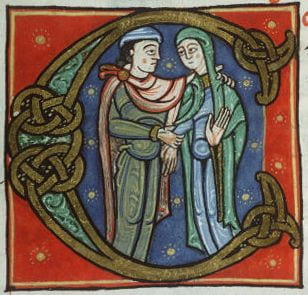This snippet from the 1360s has some interesting sub-snippets relating to crime, (non-) punishment, marriage, women and pardons. (Great build-up, I know, but stick with it…)
The patent rolls for May 1364 contain a pardon for one Master Hugh Bonehomme of Bugthorpe (Yorks). The Rex roll of the King’s Bench for Trinity term 1364 shows that Hugh had been indicted (under slightly different versions of his name) on some serious charges – the homicide of Gilbert son of John Grayve of Bugthorpe, and the ravishment/abduction (raptus) of Agnes, daughter of John Gyles of York, as well as allegedly having committed a currency export offence, and having challenged another man to a duel, or perhaps attacked him (there is mention of a shield and lance).[i]
The homicide is interesting in that the KB entry has a variety of different charges, with different variations of the alleged victim’s name – at first sight, it seemed to be suggesting that Hugh was something of a serial killer, but there seems to be some repetition. Otherwise there is nothing noteworthy in it. It is the abduction of Agnes which is my focus It was alleged that Hugh had acted with others in this, that it had happened in Lent 1362, at York, and that the abduction had been part of a dastardly plan. The offenders had used coercion and threats to make Agnes consent to marry a man called Simon Porter. Forced marriage is not unknown in this period (I have at least one example in Women in the Medieval Common Law (c.6), and it was enough of a perceived problem, at least in so far as it concerned well-off women, that there was specific legislation on the matter in the fifteenth century (which I considered somewhat in Imprisoning Medieval Women). This was not just any forced marriage, however, it was, allegedly, a forced invalid marriage – since Agnes already had a husband: Thomas Gillyng. Thomas was allegedly down some goods as well as a wife, because the entry and the pardon on the patent roll both note that Hugh and his associates removed some of Thomas’s chattels.[ii]
In the case of Agnes, there is, for once, no suggestion of ‘not unwillingness’ or complicity with regard to the leaving of her husband. In the plea roll, we have the allegation that the offenders took, ravished and abducted her with force and arms, and then used compulsion and threats: per cohercionem et minas, they made her consent (consentire) to contract an unjust marriage (matrimonium iniustum – iniustum because of ‘the other husband’, presumably).[iii] I think it is very much worth noting that ‘consent’ here is used to mean something far from free, far from voluntary. It should be a further warning against assuming we know what these words apparently denoting an exercise of free will mean, when we see them used in shorter, less contextualised, entries.
I have not come across quite such an outrageous forced ‘marriage’ before – and it will be interesting to see whether there is any further information to be had from the perspective of the Church – did any sort of matrimonial proceedings follow, to ensure that the position was clear? Did she get back to her real husband, or did he die too soon? Did she actually end up with (apparently) dodgy Simon?
Following the case through to its bitter end at common law, though, surprise, surprise, there are no serious consequences for Hugh. Clearly a man with influential friends, his pardon is said to have been granted after requests by John II of France (d. April 1364) and by certain cardinals. He was a man of some learning – called ‘Master’ (sometimes), and the Plea Roll describes him as a proctor/procurator. He had, perhaps, endeared himself to the hostage king in this capacity. The pardon – again, surprise, surprise – has absolutely nothing to say about Agnes. Jurisdictional responsibilities would, of course, dictate that the (in)validity of her marriage to Simon was something for the Church to sort out, if there was a dispute about it. Nevertheless, the entries on the patent roll and plea roll relating to Hugh and Agnes do underline the gendered nature of the concerns of common law, and its exercise.
GS 18/3/2021
[i] CPR Edw III 1361-4, 515; KB 27/415 m. 35d (IMG 455)
[ii] He is described as having been her husband ‘then’ – so possibly he also lost his life after these events.
[iii] Roman law has much to say about matrimonium iniustum, but I think the intention here is simply to call it against the rules, because of the existence of a husband.
